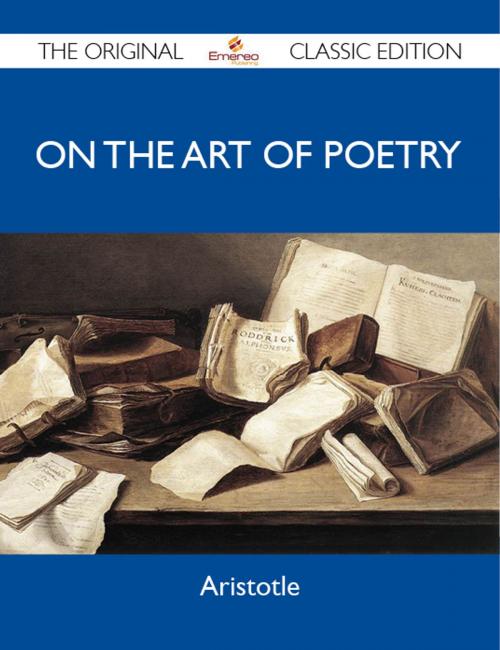On the Art of Poetry - The Original Classic Edition
Nonfiction, Reference & Language, Reference, Fiction & Literature| Author: | Aristotle Aristotle | ISBN: | 9781486420063 |
| Publisher: | Emereo Publishing | Publication: | October 24, 2012 |
| Imprint: | Emereo Publishing | Language: | English |
| Author: | Aristotle Aristotle |
| ISBN: | 9781486420063 |
| Publisher: | Emereo Publishing |
| Publication: | October 24, 2012 |
| Imprint: | Emereo Publishing |
| Language: | English |
This is a new and freshly published edition of this culturally important work by Aristotle, which is now, at last, again available to you.
Enjoy this classic work today. These selected paragraphs distill the contents and give you a quick look inside On the Art of Poetry:
In the tenth book of the Republic, when Plato has completed his final burning denunciation of Poetry, the false Siren, the imitator of things which themselves are shadows, the ally of all that is low and weak in the soul against that which is high and strong, who makes us feed the things we ought to starve and serve the things we ought to rule, he ends with a touch of compunction: We will give her champions, not poets themselves but poet-lovers, an opportunity to make her defence in plain prose and show that she is not only sweet-as we well know-but also helpful to society and the life of man, and we will listen in a kindly spirit.
...Characteristic, too, is the observation that different kinds of art grow and develop, but not indefinitely; they develop until they attain their natural form; also the rule that each form of art should produce not every sort of pleasure but its proper pleasure; and the sober language in which Aristotle, instead of speaking about the sequence of events in a tragedy being inevitable, as we bombastic moderns do, merely recommends that they should be either necessary or probable and appear to happen because of one another.
...We have no common name for a mime of Sophron or Xenarchus and a Socratic Conversation; and we should still be without one even if the imitation in the two instances were in trimeters or elegiacs or some other kind of verse-though it is the way with people to tack on poet to the name of a metre, and talk of elegiac-poets and epic-poets, thinking that they call them poets not by reason of the imitative nature of their work, but indiscriminately by reason of the metre they write in.
...The explanation is to be found in a further fact: to be learning something is the greatest of pleasures not only to the philosopher but also to the rest of mankind, however small their capacity for it; the reason of the delight in seeing the picture is that one is at the same time learning-gathering the meaning of things, e.g. that the man there is so-and-so; for if one has not seen the thing before, ones pleasure will not be in the picture as an imitation of it, but will be due to the execution or colouring or some similar cause.
...Homers position, however, is peculiar: just as he was in the serious style the poet of poets, standing alone not only through the literary excellence, but also through the dramatic character of his imitations, so too he was the first to outline for us the general forms of Comedy by producing not a dramatic invective, but a dramatic picture of the Ridiculous; his Margites in fact stands in the same relation to our comedies as the Iliad and Odyssey to our tragedies.
This is a new and freshly published edition of this culturally important work by Aristotle, which is now, at last, again available to you.
Enjoy this classic work today. These selected paragraphs distill the contents and give you a quick look inside On the Art of Poetry:
In the tenth book of the Republic, when Plato has completed his final burning denunciation of Poetry, the false Siren, the imitator of things which themselves are shadows, the ally of all that is low and weak in the soul against that which is high and strong, who makes us feed the things we ought to starve and serve the things we ought to rule, he ends with a touch of compunction: We will give her champions, not poets themselves but poet-lovers, an opportunity to make her defence in plain prose and show that she is not only sweet-as we well know-but also helpful to society and the life of man, and we will listen in a kindly spirit.
...Characteristic, too, is the observation that different kinds of art grow and develop, but not indefinitely; they develop until they attain their natural form; also the rule that each form of art should produce not every sort of pleasure but its proper pleasure; and the sober language in which Aristotle, instead of speaking about the sequence of events in a tragedy being inevitable, as we bombastic moderns do, merely recommends that they should be either necessary or probable and appear to happen because of one another.
...We have no common name for a mime of Sophron or Xenarchus and a Socratic Conversation; and we should still be without one even if the imitation in the two instances were in trimeters or elegiacs or some other kind of verse-though it is the way with people to tack on poet to the name of a metre, and talk of elegiac-poets and epic-poets, thinking that they call them poets not by reason of the imitative nature of their work, but indiscriminately by reason of the metre they write in.
...The explanation is to be found in a further fact: to be learning something is the greatest of pleasures not only to the philosopher but also to the rest of mankind, however small their capacity for it; the reason of the delight in seeing the picture is that one is at the same time learning-gathering the meaning of things, e.g. that the man there is so-and-so; for if one has not seen the thing before, ones pleasure will not be in the picture as an imitation of it, but will be due to the execution or colouring or some similar cause.
...Homers position, however, is peculiar: just as he was in the serious style the poet of poets, standing alone not only through the literary excellence, but also through the dramatic character of his imitations, so too he was the first to outline for us the general forms of Comedy by producing not a dramatic invective, but a dramatic picture of the Ridiculous; his Margites in fact stands in the same relation to our comedies as the Iliad and Odyssey to our tragedies.















